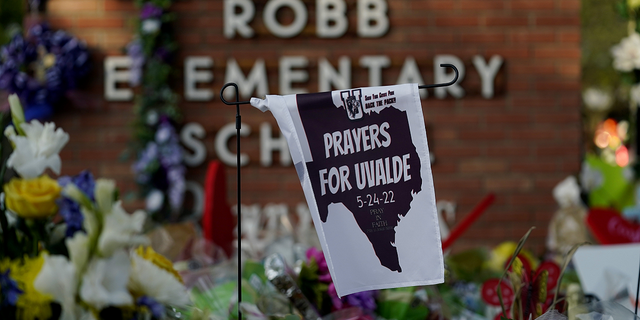NEWYou can now listen to Fox News articles!
Ohio Gov. Mike DeWine signed a bill into law Monday allowing school districts across the state to authorize teachers, principals and other staff to carry guns into classrooms with just 24 hours of training.
The new law – initially introduced by state Republican Rep. Thomas Hall as House Bill 99 – will lower the required training hours for the armed personnel from about 700 hours to just four hours of training in scenario-based or simulated training exercises and a maximum of 20 hours for first aid training, history of school shootings and reunification education, The Columbus Dispatch reported.
“In life we make choices, and we don’t always know what the outcome is going to be,” DeWine said at a press conference Monday. “What this Legislature has done, I’ve done by signing it, is giving schools an option based on their particular circumstances to make the best decision they can make with the best information they have. That’s all any decision-maker can do.”
The New York Times reported that school employees in Ohio have for years been allowed, with approval from their local school board, to carry guns onto school campuses, though a 2021 Ohio Supreme Court ruling required those individuals to undergo the same basic peace officer training as law enforcement or security personnel allowed to carry firearms at schools.
OHIO SET TO ALLOW TEACHERS TO CARRY GUNS WITH REDUCED TRAINING REQUIREMENTS
Ohio Gov. Mike DeWine discusses a law that gives school districts the option of arming trained school employees, on Monday, June 13, 2022, in Columbus, Ohio.
((AP Photo/Andrew Welsh-Huggins))
That amounted to more than 700 hours of training, so Monday’s signing will drastically lower the required hours of instruction.
After an employee is cleared to go armed, the law, as enacted, requires up to eight hours of annual training. The training programs must be approved by the Ohio School Safety Center, and DeWine announced he’s ordering the center to require the maximum 24 hours and the maximum eight hours.
Schools can provide additional training if they wish, DeWine said.
The Republican governor outlined several other school safety measures he and lawmakers have promoted, including $100 million for school security upgrades in schools and $5 million for upgrades at colleges.
The state is also adding 28 employees to the school safety center to work with districts on safety issues and to provide training under the new law. Ohio has also provided $1.2 billion in wellness funding for schools to address mental health and other issues, the governor said.

Ohio Gov. Mike DeWine speaks during a press conference, Thursday, June 2, 2022, in Avon Lake, Ohio.
((AP Photo/David Richard))
DeWine said his preference remains that school districts hire armed school resource officers, but said the law is another tool for districts that want to protect children.
He emphasized that it’s optional for school districts, not a requirement.
Mayors of Ohio’s biggest cities, including Cincinnati, Columbus, and Cleveland, planned an afternoon news conference to highlight gun violence in their communities and outline their differences with the governor over gun issues. Nan Whaley, DeWine’s Democratic opponent for governor, also planned a news conference, after denouncing his decision to sign the bill, according to The Associated Press.

A banner hangs at a memorial outside Robb Elementary School on Friday, June 3.
(AP/Eric Gay)
In a statement upon the bill’s passage, DeWine said his office “worked with the General Assembly to remove hundreds of hours of curriculum irrelevant to school safety and to ensure training requirements were specific to a school environment and contained significant scenario-based training.”
“House Bill 99 accomplishes these goals, and I thank the General Assembly for passing this bill to protect Ohio children and teachers,” he said. “I look forward to signing this important legislation.”
Monday’s signing came the same day a new law went into effect in Ohio making a concealed weapons permit optional for those legally allowed to carry a weapon.
CLICK HERE TO GET THE FOX NEWS APP
Democrats have said the law sends the wrong message coming so soon after the massacre of 19 children and two teachers at an elementary school in Uvalde, Texas. Republicans say the measure could prevent such shootings. Lawmakers fast-tracked the legislation to counter the impact of a court ruling that said, under current law, armed school workers would need hundreds of hours of training.
The Associated Press contributed to this report.